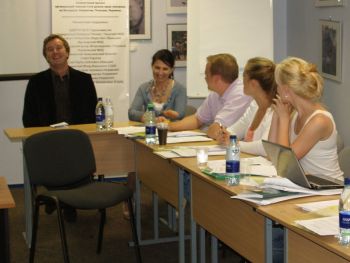Exams, tests, grades, revisions – these are the words commonly used by the project participants. The only difference with a school is that everyone is not interested in skipping classes. Attendance is nearly perfect here.
Belarusian lawyers understand that receiving new types of knowledge serves their own interests. And it is not an accident that all of them did their outmost to enrol into this program despite the fact that at home they could run into serious troubles: the Belarusian authorities do not hold human rights in high regard.
“I had a clear vision of what this project is about and what kind of knowledge I’ll be getting. We are really lacking know-how in the international law,” one lawyer from Minsk, who would like to stay anonymous, shared.
She also noted that many participants were motivated by interests or aspirations to use something new in their professional lives.
Outlook change
The program, composed of seven sessions, is designed so that participants acquire new skills in using international human rights instruments to defend their clients in Belarus. The first session took place in Chernihiv (Ukraine) earlier this year.
However, most of their work the participants do at home by reading suggested materials and completing required assignments.
“The majority of the course participants are professional lawyers. That is why it is easier to work with them then with beginners. There is no need to explain to them the basics of law.
“On the other hand it is also rather challenging as all of them got used to work in the Belarusian system, exclusively within the domestic legislation,” Barys Zvozskau, Belarusian HRH former president and one of the course lecturers, said.
He stressed that this course was specifically directed to also change Belarusian lawyers’ professional outlook.
How to appeal to the Constitutional Court?
Constitutional mechanisms of defending human rights and the freedom of expression as interpreted by the European Human Rights Court were the main accent of the August session in Vilnius.
The situation with the freedom of expression in Belarus was scrutinised de facto and de jure.
Prominent lawyers from Belarus, a former deputy chair of the Constitutional Court Valer Fadzeeu and Andrei Bastunets from Centre of Legal Defence for Mass Media, shared their expertise and knowledge.
The course participants were learning about the Constitutional Law and available mechanisms of appeals to the Constitutional Court. In their homework on the topic they will have to prepare their own detailed appeals to the Court.
Henrikas Mickevičius, a well known Lithuanian human rights defender from the Institute of Human Rights Monitoring, made a presentation on the international standards of the freedom of expression with examples of violations of that right from around the globe.
Greetings from Scandinavia
Deputy ambassador of Norway in Lithuania Terje Aalia addressed the participants.
Norway is the main donor the Human Rights House in Norway and the HRH Network. It also provides the funds to run the International Law in Advocacy program.
According to the embassy representative, the Norwegian MFA highly appreciates a possibility to support human rights in a problematic country like Belarus.
“I would like to acknowledge your big role as human rights defenders in society,” Mr. Aalia said in his address.
He called upon the participants to share their knowledge “with colleagues, with the society at large and also with a new generation of human rights defenders.”
“Now you will be able to train others. You have taken upon yourselves the responsibility to spread your knowledge in your country,” the Norwegian diplomat said to the participants.
First time in EU
The participants hoped that the effort they spent on this program would be fruitful despite the fact that there are indeed very grave problems in Belarus with implementing international human rights treaties.
“Some say that even our Constitution has a largely declarations character and that it is pointless to refer to its articles – what is there to say about the international treaties?” the lawyer from Minsk was lamenting.
Besides the useful new knowledge for some lawyer this course was the first chance to visit an EU country.
***
The 28-30 August seminars in Vilnius was the second session of the educational project Bring International Standards Home, which is based in Belarusian HRH.
Overall the course includes seven sessions.
This is a third course offered by the project to Belarusian HR defenders and lawyers. The project itself is a part of the larger program International Law in Advocacy.
Participants of the previous courses are actively using new instruments in courts and in defending individual rights inside Belarus and on the international level.
Several former project participants joined the educational sessions anew – this time as experts.





